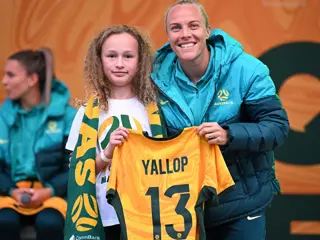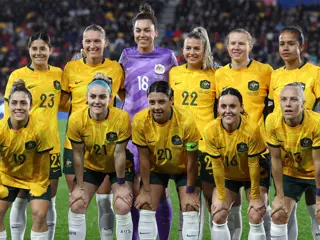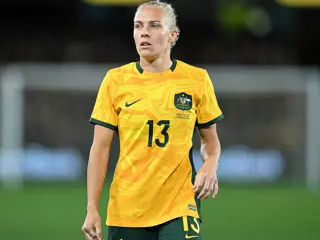Player Story
Tameka Yallop: "This World Cup will leave a lasting legacy for women’s football"
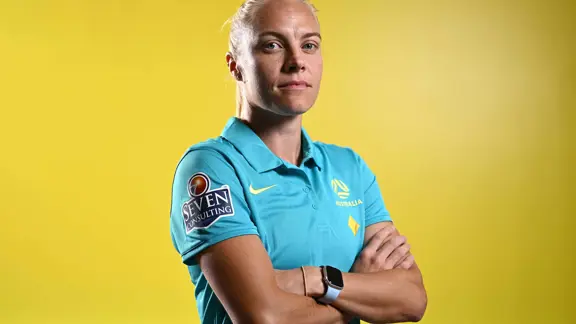
Australia international Tameka Yallop, 32, is set to make her fourth appearance at a FIFA Women’s World Cup. The midfielder is a member of both PFA Australia’s executive committee and FIFPRO's Global Player Council.
By Tameka Yallop
My first World Cup was in Germany in 2011 and it was a truly amazing atmosphere. It made me realise just how big football was in Europe compared to back home, and I remember being so impressed with the quality of the pitches we played on. Growing up in Australia most of our fields were just dirt, so it was an eye-opener for me in terms of the growth of the game globally.
The contrast of being forced to play on turf at the 2015 World Cup four years later in Canada, though, didn’t sit well with me. It was a horrible playing experience and one that the men would never be subjected to at this level. It made me think: why was this being experimented with at the Women’s World Cup? Why weren’t we being shown the same standards? Why were we going backwards?
There was justifiably an outcry about it, and although we had to persevere and play the tournament as planned, it was a big moment for awareness in women’s football. By the time we stepped up to play at France 2019, the publicity of the women’s game had exploded across the globe.
This disparity can be found all throughout football when you compare the men’s and women’s games, and thankfully we’re starting to close some of these gaps across the board. Just four years ago the women’s national team was expected to travel 30+ hours in economy, only to play just a few days later and it was absolutely exhausting; you barely had time to remember what jersey you were supposed to be wearing never mind being at the top of your game. The men’s team, on the other hand, would never be subjected to that. It was frustrating as athletes to be treated differently in that regard.
As a team we spoke to our PFA about it. They represent Australian footballers regardless of gender, and it really helped to determine where the differences were and what steps needed to be taken. We’ve had great support from the men’s team as well and we’ve maintained an open dialogue across the board. Australia is a sport-focused nation, and I think we’re at the point that no-one wants to hamper opportunities for women – whether that be themselves, their team-mates, their daughters or sisters. We are all united in wanting that equal opportunity.
The changes that have since been made, particularly with travel, have been an absolute game-changer. You arrive at camp having had a full night’s sleep in business class without all the previous stiffness and discomfort, and it makes coping with the jet lag so much easier. It had a direct impact on players both mentally and physically, and our performance saw a huge uplift as a consequence. Our national team is now aware of how big a part travel plays in our game and they’ve been proactive in accommodating for it.
There have always been trailblazers in women’s football when it comes to setting the standards of the game; Germany have been up there for a while in ensuring competitiveness across both their men’s and women’s squads, England have taken remarkable steps with their domestic league, and now Australia is standing out as one of those countries that is showing the way forward – especially with regards to the national team.
The women’s game is growing exponentially. It’s crazy to compare where we are at now to what I was experiencing even five or six years ago. When I played in Japan there were just three professional players in the team, while everyone else left training to go straight to a warehouse for work, before picking up an afternoon training session when they finished their shift. While I realise this is still the case for many, there’s a definite surge in attention for women in the game across the globe. And it’s infectious.
Momentum has been increasing and the game is at the most competitive level it’s ever been. It's mind-blowing to think we can transfer all the hype around football that I witnessed in Europe in my first World Cup and bring it Down Under for everyone here to experience. 2023 is going to be a landmark event that leaves a lasting legacy for women’s football. It’s exciting that it’s happening on home soil and that women’s football can be something that inspires and unites Australians.
FIFA’s public acknowledgements of the changes that are going to be made at this tournament are a massive step forward. It’s something I never thought I would see as a player. Equality in travel, improved accommodation, increase in finances – they all work towards the benefit of the game. We’re going to have fresher, more competitive players, and everyone is going to be firing on all cylinders from the first match.
I think it was my own experience of the changes that we achieved so recently with PFA Australia that motivated me to be one of the 150 players that signed the open letter to FIFA, seeking this professionalisation of the tournament. I’m proud to have been a part of it. Although there’s still plenty of room for improvement, it feels like we have opened a dialogue with solid commitments to change.
I'm now on PFA Australia’s executive committee and it’s great to be in a position where we can see what aspects of the game are being focused on and where we are progressing. It’s a good balance of opinions between the executives, the men’s players and the women’s players, and it gives us a good understanding of where football in the country is at.
Football in Australia is continually changing and we’re on the verge of an evolution that could see more depth in our own domestic leagues. Growing up, it wasn’t until I was 13 that there was a women’s team available to me, and I really want to help push that developmental stage to create more opportunities for youth players – in both men’s and women’s teams – strengthening the selection for our Australian leagues.
There’s so much I want to achieve in Australia and my positive experiences with driving change has inspired me to get involved in a bigger way. When I travelled overseas I often saw standards that I aspired to for my own country, but on the other side of the coin, there are so many countries that are much worse off and who have so little to work with to start improvements. When I was offered a position on FIFPRO’s Global Player Council, it was an easy decision to say yes. It gave me an opportunity to pursue equality – between genders, countries, backgrounds – on a global scale.
I want to help in any way I can, but for me maternity in football is a huge personal focus. Although we’ve seen improvements in this area in the last year or so, it’s only the tip of the iceberg. The experience of being a mother and an athlete is something that has only come later in my career, and even the opportunity of having a family was facilitated by my wife retiring from football.
I feel so lucky to have my daughter, Harley, in my life. But it does draw attention to how many retired athletes don’t have children. It’s sad to think that for some of them it was a choice they had to make because of their careers. I want to help change that mentality and give women the opportunity to start thinking about having children before their careers are over and assure them that they can come back to the game stronger and supported.
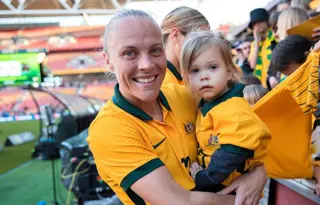
We’re starting to see more and more examples of mothers in football. It’s important we pay attention to the struggles that they are facing and how to adapt to them – because they are the ones setting the example for future players. Clubs and national teams need to listen and understand the needs of the players not just during pregnancy, but as mothers with an actual child to care for alongside their careers.
There’s a long way to go in that regard, but I’m proud to say that Australia are one of the national teams that are setting the standards there, and I’ve had a positive experience in training camps with my kid. There are so many things to consider, such as a nanny, food, and travel. But above all, the most important thing to provide is a welcoming atmosphere – and Australia have undoubtedly delivered that.
We have two kids in the camp, and it’s been made to feel like a highlight. There’s much more balance, and it brings out the best in all the players, not just the mothers. If we’ve had a bad session, the kids don’t realise or care, they just go about their day and do something funny and, suddenly, the stress is lifted.
Balancing life is always difficult and I think being a player and a parent is always going to mean time away from your child that you wouldn’t necessarily choose. However, I’m at a point that I’ve got a great equilibrium that wouldn’t have been possible just a few years ago – and that’s all thanks to the efforts of my club and national team.
I’ve been lucky enough to play during a time of real social upheaval in women’s football, and I’ve benefitted massively from the fights and work of the players who have gone before me. However, there’s still so far to go. I want to play my part – both on the field and on the board – in making the game better for the generations to come.

